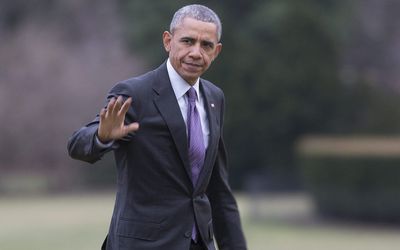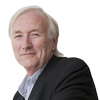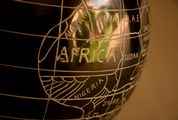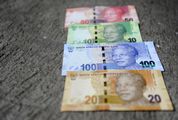NOT surprisingly, it was a writer of horror stories who nailed it. Stephen King tweeted at the weekend that: "Conservatives who for eight years sowed the dragon’s teeth of partisan politics are horrified to discover they have grown an actual dragon."
He was referring, of course, to the US election process, in which property mogul and television host Donald Trump is now the presumptive presidential candidate of the Republican Party for the elections in November. So much has been written about Trump, it’s becoming an exercise in futility to join the throng of centrists decrying him. He is, in short, ridiculous, and he would turn the presidency of the world’s most important country into the worst of all conceivable fates: a laughing stock.
Yet so mesmerising has this election campaign become, it’s easy to lose track of another side of US politics — the actual president in power.
Early in his presidency, Barack Obama was controversially granted the Nobel Peace prize. At the time, the consensus was that the prize was granted absurdly early, before he had actually achieved anything.
But it’s possible that as he leaves, he may well have lived up to the title he was granted too early, and if so, the committee of Norwegian politicians might have been proved right.
The arguments against Obama from an international point of view are not without weight.
Relations between the US and Russia, the old enemy, are terrible. But it’s important to note that the hopeful détente that was developing between the US and Russia was destroyed not by Obama, but by pre-emptive actions by a bellicose Russian leader, Vladimir Putin, who has successfully isolated his country not only from the US, but respectability everywhere, just as his country was entering an economically difficult period. Not brilliant.
The unknowable question is whether a different president in the US might have exacerbated the situation by over-reacting.
Obama shrewdly judged that Putin would eventually be hoist by his own petard, and that a US over-reaction would be just the thing that would boost Putin’s declining support.
The more serious charge against Obama is that his reticence to action in the Middle East, particularly in Syria, allowed the country and, subsequently, the region to implode.
That simultaneously created a refugee crisis for Europe of a scale seldom seen in modern history, and worse, allowed the vacuum to be filled by bloodthirsty terrorist groups. Obama said there was a line in the sand, but in the end there wasn’t.
This criticism holds water, but it underestimates the complexity of the Syrian situation, and in a sense, the Middle East dynamic, which often defies understanding.
The reliance of the region on a single export, oil, has misshapen its economics, reinforced religious and ethnic power blocks, closed off opportunities for personal development and stifled trade.
The result has been the emergence of power cliques, often notionally based on religion, but that practise a philosophy more akin to feudalism than to the broad ideas of faith.
On the other side of the coin, Obama has miraculously normalised relations with both Cuba and Iran, something I really never thought I would see in my lifetime. Neither relationship is comfortable, and neither may endure, but behind these headline events and many more on an incremental scale is the gradual acceptance internationally of essential values of the enlightenment: reason and liberty.
The enlightenment, Siècle des Lumières in French or Aufklärung in German, brought with it the ideas of empiricism in science, constitutional government in politics, and tolerance and fraternity in human relations. It is these ideas that underpin the Nobel committee’s ideals, and it is what they look for in candidates.
As he leaves office, Obama will bequeath a mixed record. But in one sense, he has overperformed. The true judge of politicians is not necessarily what they deliver to their own support base, but what they deliver to humanity, and that is no more than a chance at prosperity.
South Africans, I suspect, are beginning to understand this with much more clarity now. The advent of democracy in SA was a huge step gained at enormous risk, but in the end, all it gave the country was a chance to move forward.
And that, it turns out, is no small thing — but it’s the start, not the end, of the story.

US President Barack Obama arrives at the White House in Washington, DC, the US, on Friday. Picture: EPA/CHRIS KLEPONS
NOT surprisingly, it was a writer of horror stories who nailed it. Stephen King tweeted at the weekend that: "Conservatives who for eight years sowed the dragon’s teeth of partisan politics are horrified to discover they have grown an actual dragon."
He was referring, of course, to the US election process, in which property mogul and television host Donald Trump is now the presumptive presidential candidate of the Republican Party for the elections in November. So much has been written about Trump, it’s becoming an exercise in futility to join the throng of centrists decrying him. He is, in short, ridiculous, and he would turn the presidency of the world’s most important country into the worst of all conceivable fates: a laughing stock.
Yet so mesmerising has this election campaign become, it’s easy to lose track of another side of US politics — the actual president in power.
Early in his presidency, Barack Obama was controversially granted the Nobel Peace prize. At the time, the consensus was that the prize was granted absurdly early, before he had actually achieved anything.
But it’s possible that as he leaves, he may well have lived up to the title he was granted too early, and if so, the committee of Norwegian politicians might have been proved right.
The arguments against Obama from an international point of view are not without weight.
Relations between the US and Russia, the old enemy, are terrible. But it’s important to note that the hopeful détente that was developing between the US and Russia was destroyed not by Obama, but by pre-emptive actions by a bellicose Russian leader, Vladimir Putin, who has successfully isolated his country not only from the US, but respectability everywhere, just as his country was entering an economically difficult period. Not brilliant.
The unknowable question is whether a different president in the US might have exacerbated the situation by over-reacting.
Obama shrewdly judged that Putin would eventually be hoist by his own petard, and that a US over-reaction would be just the thing that would boost Putin’s declining support.
The more serious charge against Obama is that his reticence to action in the Middle East, particularly in Syria, allowed the country and, subsequently, the region to implode.
That simultaneously created a refugee crisis for Europe of a scale seldom seen in modern history, and worse, allowed the vacuum to be filled by bloodthirsty terrorist groups. Obama said there was a line in the sand, but in the end there wasn’t.
This criticism holds water, but it underestimates the complexity of the Syrian situation, and in a sense, the Middle East dynamic, which often defies understanding.
The reliance of the region on a single export, oil, has misshapen its economics, reinforced religious and ethnic power blocks, closed off opportunities for personal development and stifled trade.
The result has been the emergence of power cliques, often notionally based on religion, but that practise a philosophy more akin to feudalism than to the broad ideas of faith.
On the other side of the coin, Obama has miraculously normalised relations with both Cuba and Iran, something I really never thought I would see in my lifetime. Neither relationship is comfortable, and neither may endure, but behind these headline events and many more on an incremental scale is the gradual acceptance internationally of essential values of the enlightenment: reason and liberty.
The enlightenment, Siècle des Lumières in French or Aufklärung in German, brought with it the ideas of empiricism in science, constitutional government in politics, and tolerance and fraternity in human relations. It is these ideas that underpin the Nobel committee’s ideals, and it is what they look for in candidates.
As he leaves office, Obama will bequeath a mixed record. But in one sense, he has overperformed. The true judge of politicians is not necessarily what they deliver to their own support base, but what they deliver to humanity, and that is no more than a chance at prosperity.
South Africans, I suspect, are beginning to understand this with much more clarity now. The advent of democracy in SA was a huge step gained at enormous risk, but in the end, all it gave the country was a chance to move forward.
And that, it turns out, is no small thing — but it’s the start, not the end, of the story.




















Change: -0.03%
Change: 0.05%
Change: -0.07%
Change: 0.39%
Change: -1.37%
Data supplied by Profile Data
Change: -1.00%
Change: 0.40%
Change: -0.03%
Change: 0.00%
Change: 0.09%
Data supplied by Profile Data
Change: 1.23%
Change: 0.93%
Change: 1.16%
Change: 1.79%
Change: 0.69%
Data supplied by Profile Data
Change: 0.48%
Change: 0.20%
Change: -0.26%
Change: -1.91%
Change: -0.37%
Data supplied by Profile Data